
-
Find the right food for your petTake this quiz to see which food may be the best for your furry friend.Find the right food for your petTake this quiz to see which food may be the best for your furry friend.Featured products
 Perfect Weight Small & Mini Adult Dog Food
Perfect Weight Small & Mini Adult Dog FoodHill's Science Plan Adult Small & Mini Dog Food with Turkey is a complete premium pet food for adult small dogs from 1 year old that are prone to weight gain or slightly overweight. This deliciously smooth mousse is formulated to deliver the appropriate amount of energy to support weight maintenance in adult dogs.
Shop Now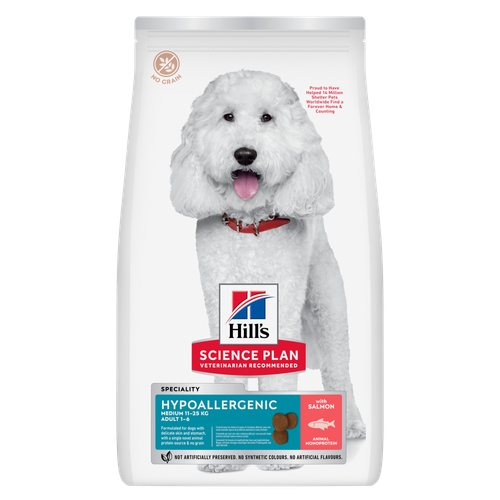 Hypoallergenic Medium Adult Dog Food
Hypoallergenic Medium Adult Dog FoodScience Plan Hypoallergenic Medium Adult dog food with Salmon is a gentle, science-led formula crafted for dogs with food sensitivities. Made with carefully selected, high-quality novel proteins and no grains, it’s tailored to minimise common triggers that can lead to skin and digestive discomfort.
Shop Now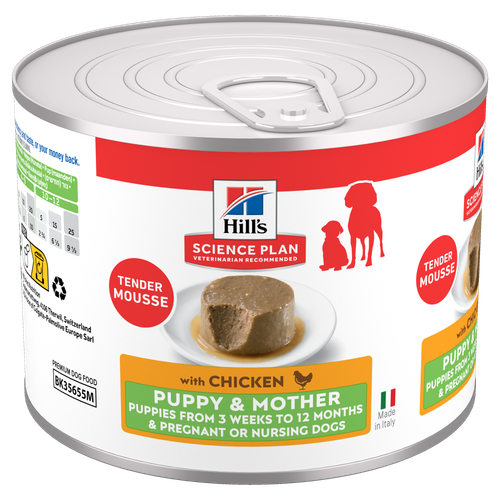 Puppy & Mother Tender Mousse Dog Food
Puppy & Mother Tender Mousse Dog FoodHill's Science Plan Puppy & Mother Tender Mousse Dog Food with Chicken is a complete premium pet food for puppies and pregnant or nursing dogs. Formulated with chicken and other specially selected ingredients, including minerals and antioxidants to support gut health and optimal growth, it comes in a soft mousse texture they'll love.
Shop NowFeatured products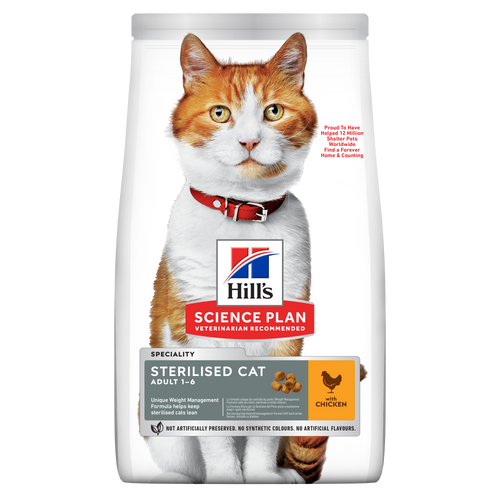 Sterilised Adult Cat Food
Sterilised Adult Cat FoodHill's Science Plan Adult Sterilised Cat Dry Food with Chicken is specially formulated with ActivBiome+ Multi-Benefit Technology. It is a precisely balanced nutrition, tailored to meet the needs of sterilised cats, to help keep sthem lean & healthy.
Shop Now Oral Care Adult Cat Food
Oral Care Adult Cat FoodHill's Science Plan Oral Care Adult Cat Food with Chicken contains clinically proven kibble technology to reduce plaque & tartar build up.
Shop Now Hypoallergenic Dry Cat Food
Hypoallergenic Dry Cat FoodHILL'S SCIENCE PLAN Hypoallergenic Adult cat food with egg & insect protein is a complete pet food for adult cat 1–6 years old. It's formulated for cats with delicate skin and stomach, with limited high quality novel protein sources & no grain.
Shop Now -
Dog
- Dog Tips & Articles
-
Health Category
- Weight
- Food & Environmental Sensitivities
- Urinary
- Digestive
- Joint
- Kidney
-
Life Stage
- Puppy Nutrition
- Adult Nutrition
- Senior Nutrition
Cat- Cat Tips & Articles
-
Health Category
- Weight
- Skin & Food Sensitivities
- Urinary
- Digestive
- Kidney
-
Life Stage
- Kitten Nutrition
- Adult Nutrition
Featured articles Tips For Mixing Wet And Dry Pet Food
Tips For Mixing Wet And Dry Pet FoodDiscover tips for mixing wet and dry pet food to ensure balanced nutrition and variety for your pet. For comprehensive feeding advice, visit Hill's Pet UK.
Read MoreTips for Working From Home With a PetGet helpful information on how to get all of your work done while keeping your dog or cat entertained when working from home.
Read More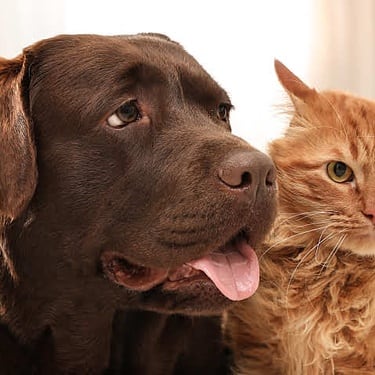 What Cleaning Products Are Safe for Pets?
What Cleaning Products Are Safe for Pets?Learn which cleaning product ingredients can be hazardous for dogs & cats, which alternatives are safer and tips for using cleaning products around pets.
Read More -


If you have ever seen your cat peeing blood, you know just how alarming it can be. While it isn't something one ever hopes to witness, blood in cat urine is actually quite common. Hematuria, the scientific name for having blood in the urine, can be caused by abnormalities in the urinary tract or even disease processes elsewhere in the body that can affect the urinary tract or kidneys.
Blood in Cat Urine: Signs to Look For
While hematuria may be as obvious as blood or blood clots in the urine, it may not always be so visible. Most instances of hematuria are actually diagnosed at the microscopic level on what appears to be normal-colored urine; in these cases, there's only a small amount of blood. Hematuria may cause urine to turn pink or red.
According to the American Veterinary Medical Association, some of the other signs you may see along with a change in the urine's color include:
- Increased drinking
- Increased urination
- Straining to urinate
- Vocalizing when in the litter box
- Going in and out of the litter box repeatedly
- Urinary accidents outside of the litter box
- Inability to urinate altogether (a medical emergency)
- Bruising on the skin in the form of obvious bruises or small dots
- Bleeding from abnormal locations, such as the nose, gums, eyes, ears or rectum, and bloody vomit or feces
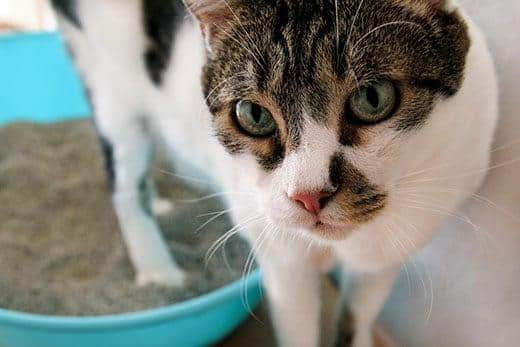
Causes of Blood in Urine
If reading these signs has sent you into a panic, take a deep breath. Some of these signs are not typically associated with blood in cat urine and are seen only with rare diseases. Most cases of hematuria in cats are the result of urinary illness and your veterinarian is the best person to help identify what and where exactly that source of illness is.
Your vet will start by taking a medical history of your cat and a physical exam. Some basic lab work for a cat peeing blood may include blood tests, such as a serum biochemistry panel and complete blood count (CBC), as well as an analysis of the urine. Depending on the potential underlying disease, your vet may recommend more specific lab tests, such as a panel to check for abnormalities in blood clotting. If your vet suspects a urinary tract infection, a urine culture test can help identify the specific bacteria that may be present. Abdominal X-rays or an abdominal ultrasound are often recommended to help identify urinary tract stones, tumors or other abnormalities that can cause a cat to pee blood, such as an inflamed bladder.
Most cases of hematuria in cats are due to FIC (feline idiopathic cystitis). Urinary tract infections are actually pretty rare among cats.


Tasty Tips
Cat Peeing Blood: Treatment
As with many diseases, treatment for blood in the urine varies depending on the exact cause. For example, kidney or bladder stones may sound like a complete diagnosis, but your vet needs to know what type of stones they're dealing with. Certain stones can be treated noninvasively with a therapeutic food that is capable of dissolving stones entirely. Some stone compositions are resistant to dissolution and will require surgery. Knowing as much as possible about the illness is critical to solving the problem.
Preventing Common Urinary Problems in Cats
You may have heard of a cat parent who struggled with their cat urinating inappropriately or perhaps you're a bit more acquainted with this yourself than you would like. Sometimes called feline lower urinary tract disease (FLUTD), this refers to a spectrum of different diseases that result in inappropriate urination from our feline roommates, explained the Cornell Feline Health Center. No one fully understands why these conditions develop or how to always successfully treat them. Here are two broad categories you can experiment with to prevent your cat from developing feline lower urinary tract signs (LUTS).
- Environment and stimulation: While you may think your house cat lives a cushy life, cats with lower urinary tract signs may disagree. Cats with FLUTD are prone to stress and are a bit higher maintenance than most cats. Giving the cat choices in terms of where to play, rest, eat and urinate can help to minimise stress. For example, each cat should have access to a private rest area, scratching posts and toys. Cats prone to stress often enjoy high perches to keep watch of their surroundings. Ideally provide one litter box for each cat, plus one extra. Cleaning the litter box daily is important for many cats with LUTS (and all cats, for that matter) because they may not want to use a dirty litter box, and therefore may find a cleaner (less optimal) place to do their business.
- Proper nutrition and hydration: The most important ways to help prevent lower urinary tract signs are proper nutrition and adequate water intake. Feeding wet foods is the number one way to improve overall water intake. Circulating water fountains may also be an option to encourage cats to drink more water to increase their water intake. The goal is to keep your cat well-hydrated so the urine is less concentrated and less prone to form crystals, which are the building blocks of stones.
Ensuring your cat eats a well-balanced food that's tested for its varying life stage (not simply "all" life stages) is very important. Some foods may have high levels of minerals that may contribute to the development of crystals and stones, which may contribute to lower urinary tract disease.
While cats with LUTS are common, if you ever notice a cat peeing blood, never make assumptions. Always seek veterinary care first to rule out treatable diseases, and remember that the inability to urinate is a life-threatening medical emergency.


Dr. Laci Schaible is a small animal veterinarian, veterinary journalist, and a thought leader in the industry. She received her Doctor of Veterinary Medicine from Texas A&M University and her Masters in Legal Studies from Wake Forest University.
Related products
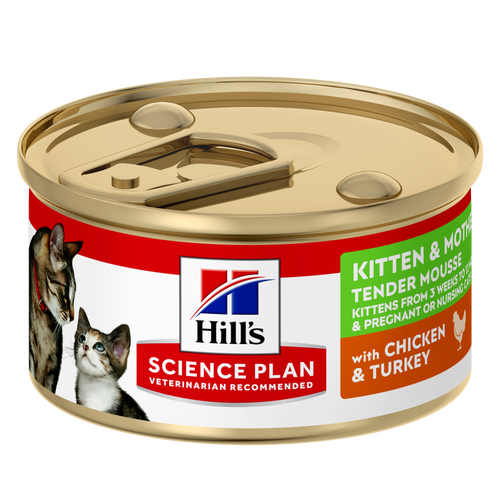
Hill's Science Plan Kitten & Mother Tender Mousse Cat Food with Chicken & Turkey is a complete premium pet food for kittens from weaning until 1 year old and for pregnant and nursing cats. Formulated with chicken, turkey and other specially selected ingredients to support gut health and optimal growth. It comes in a soft mousse texture they'll love.

HILL'S SCIENCE PLAN Hypoallergenic Adult cat food with egg & insect protein is a complete pet food for adult cat 1–6 years old. It's formulated for cats with delicate skin and stomach, with limited high quality novel protein sources & no grain.

Hill's Science Plan Oral Care Adult Cat Food with Chicken contains clinically proven kibble technology to reduce plaque & tartar build up.

Hill's Science Plan Adult Sterilised Cat Dry Food with Chicken is specially formulated with ActivBiome+ Multi-Benefit Technology. It is a precisely balanced nutrition, tailored to meet the needs of sterilised cats, to help keep sthem lean & healthy.
Related articles
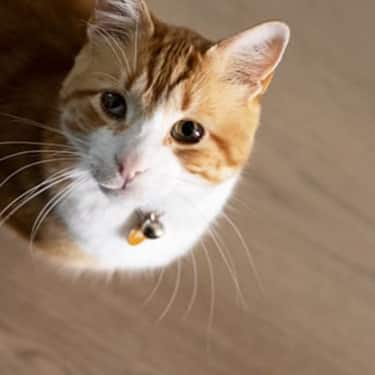
Learn how to spot the signs of a skin condition in your cat and the steps to take for their wellbeing. For comprehensive care advice, visit Hill's Pet.
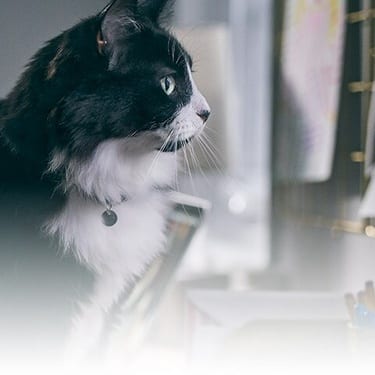
While hairballs are a common occurrence of cats, there are steps you can take to help them manage their problem and keep them healthy.
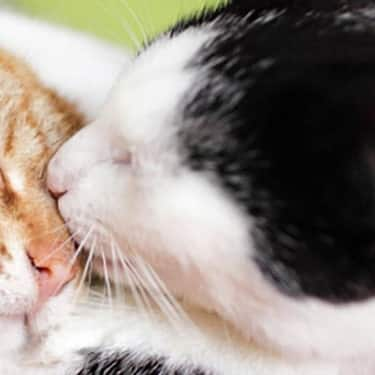
Learn the different factors that might be contributing to your cat's weight gain, and how bigger doesn't always mean better.
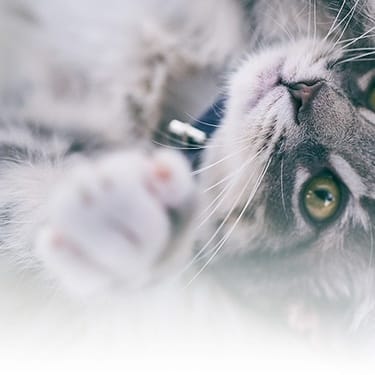
South African vets say more than half the patients they see are overweight. Learn more about managing your cat’s weight.

Put your cat on a diet without them knowing
Our low calorie formula helps you control your cat's weight. It's packed with high-quality protein for building lean muscles, and made with purposeful ingredients for a flavorful, nutritious meal. Clinically proven antioxidants, Vitamin C+E, help promote a healthy immune system.
Put your cat on a diet without them knowing
Our low calorie formula helps you control your cat's weight. It's packed with high-quality protein for building lean muscles, and made with purposeful ingredients for a flavorful, nutritious meal. Clinically proven antioxidants, Vitamin C+E, help promote a healthy immune system.

